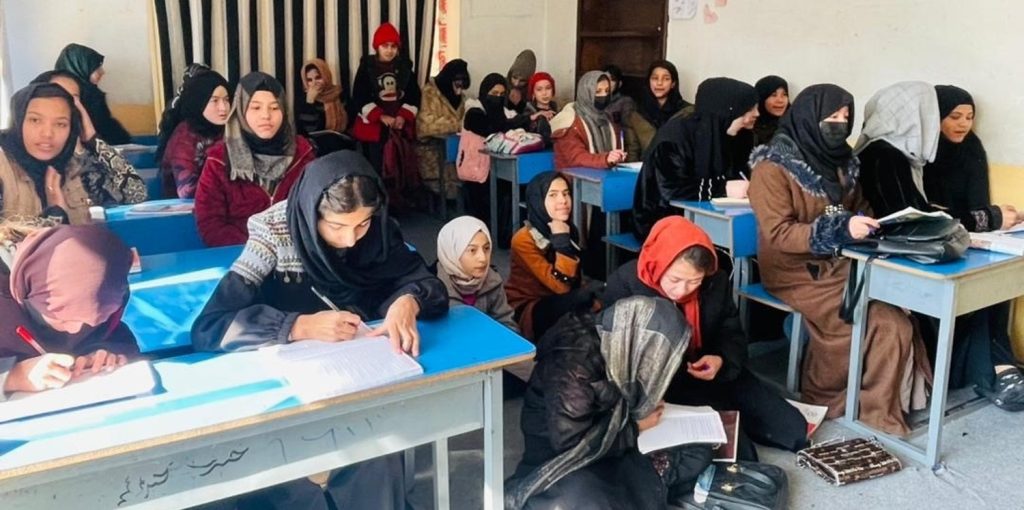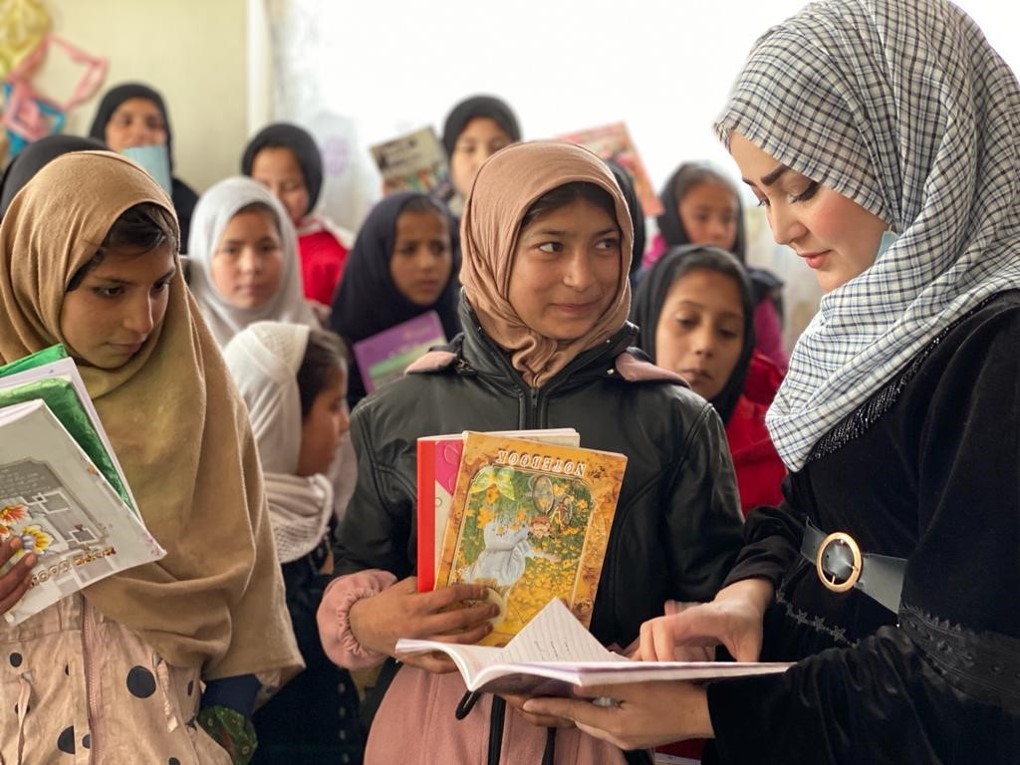
About the Together Women Rise Grants Program
Together Women Rise’s Grants Program has two key components that support our overall mission to achieve global gender equality. Featured Grants are largely focused on delivering direct services by funding grassroots organizations that empower and support women and girls in low-income and marginalized countries in the Global South. Our Transformation Partnerships are designed to invest in areas where we can make the biggest impact on achieving global gender equality by addressing the root causes of gender inequality.
Through our Featured Grants Program, we highlight a different organization/project each month, providing a variety of learning materials on the issue and how the grant will be used.
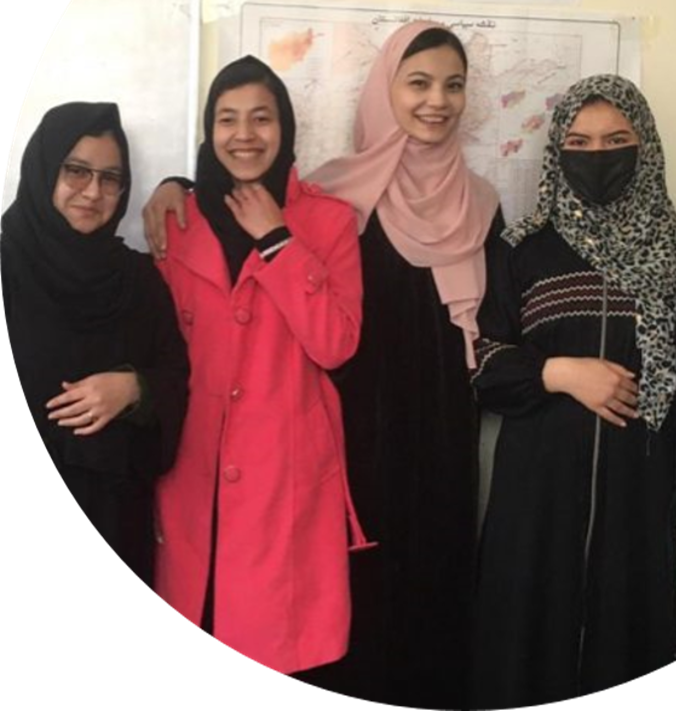 Featured Grants may include:
Featured Grants may include:
- Project grants to fund a specific project or a particular deliverable for a specific timeframe; or
- General Operations grants to cover an organization’s day-to-day, ongoing expenses, such as salaries, utilities, office supplies and more; or
- Capacity-building grants to strengthen an organization’s systems and thereby increase its effectiveness.
The Global Issue
Where War and Conflict Exist, Women and Girls Disproportionately Bear the Burden
The burden of conflict lands squarely at the doorstep of women and children.
What happens when home becomes a war zone? Women and children face hunger, illness, injury, assault, displacement, and enduring trauma. Extreme food insecurity is associated with instability/conflict and totalitarian regimes, resulting in the threat of stunting for children who live there. Trafficking, sexual violence, and gender-based violence all increase during conflict. Because war brings hunger and poverty, it can leave girl children vulnerable to being sold or traded so other members of the family can survive. Women and children are at high risk for displacement, since they are often forced to flee their homes in search of safety. And even though they bear a disproportionate share of the burden of conflict, women are likely to be excluded from the peace process.
| “It has probably become more dangerous to be a woman than a soldier in an armed conflict.”
Major General Patrick Cammaert, Former UN Peacekeeping Commander |
Life Challenges of the Women Served
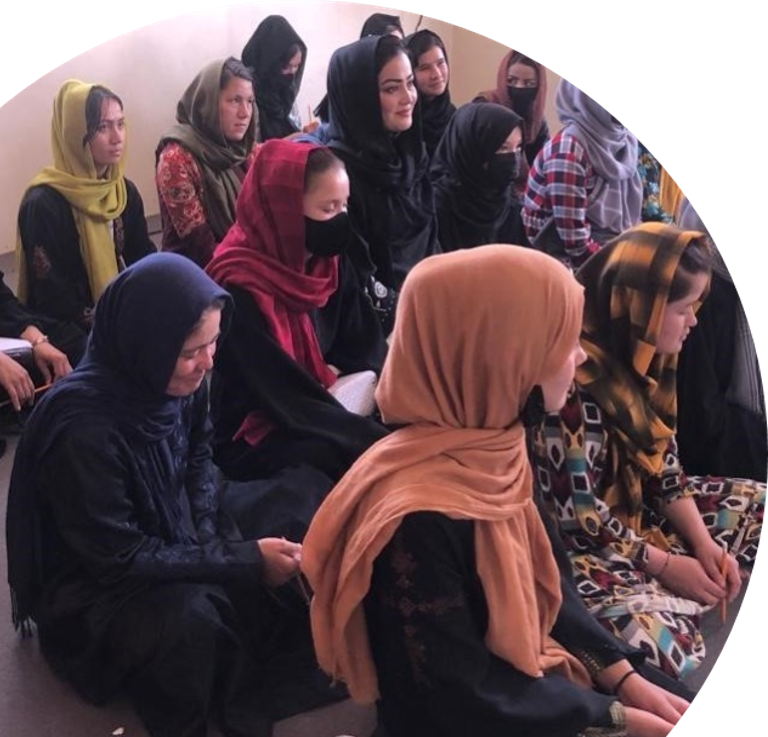 Few places illustrate the impact of war and conflict on women more acutely than Afghanistan, where the rights of women have ebbed and flowed at the hands of those in power. In late 2021, the Taliban resumed power, resulting in severe outcomes that had such a profoundly disproportionate impact on women and girls that it is considered gender apartheid. Women and girls have essentially disappeared from all public life, but they are not forgotten, and they have not been abandoned.
Few places illustrate the impact of war and conflict on women more acutely than Afghanistan, where the rights of women have ebbed and flowed at the hands of those in power. In late 2021, the Taliban resumed power, resulting in severe outcomes that had such a profoundly disproportionate impact on women and girls that it is considered gender apartheid. Women and girls have essentially disappeared from all public life, but they are not forgotten, and they have not been abandoned.
Since the Taliban’s takeover, women and girls have lost access to education, employment, public spaces, and other basic freedoms. Many are isolated and live in fear. The United Nation’s Afghanistan Socio-Economic Outlook 2023 report highlights that “without continuity for girls’ education and women’s ability to work, prospects for the country’s recovery will remain grim.”
Among other atrocities, the Taliban’s actions caused a hunger crisis. Food insecurity is rampant. There has been a doubling of families living in poverty, curbs on girls’ education and women’s right to work, strict dress codes, and early marriage for girls. Wives whose husbands were killed during the conflict can be forced into another marriage while their daughters can be forced into child labor for pennies a day. These oppressive actions limited where women could go and crushed any opportunity for them to take part in public life. Since 2021, the Taliban has inflicted more than 80 harsh edicts on women and girls, aimed at eliminating females from formal education, employment, free movement, and basic services like access to parks and restaurants, with plans to continue these human right violations indefinitely.
According to UN Women, the Taliban’s restrictions are being inflicted more frequently and severely. Women have lost any influence on decision-making they had before the conflict, especially when it comes to household decisions. Women have become increasingly isolated, suffering gender-based violence and serious mental health concerns. Up to 90 percent report bad or very bad mental health, including thoughts of suicide. They feel trapped in a life in which freedom has been replaced by fear.
Afghanistan is largely considered the worst country in the world in which to live as a woman. Ninety percent of Afghan women are estimated to experience some form of gender-based violence – including physical, sexual, and psychological violence – in their lifetimes.
The United Nations Development Program’s report on the first year following the assumption of power by the Taliban found that, in that time, among government jobs lost by women, 82 percent were in the Ministry of Education. This follows the increasing prohibitions on girls’ education. The economy was decimated, and the microfinance sector – of key importance to female borrowers – was near collapse.
About Afghanistan
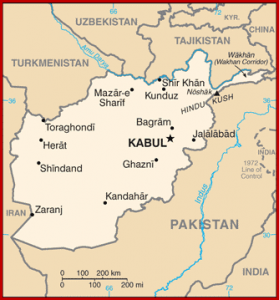 Afghanistan is in Southern Asia, north and west of Pakistan, east of Iran. The country is slightly smaller than Texas, and it borders China, Iran, Pakistan, Tajikistan, Turkmenistan, and Uzbekistan. The climate is arid to semiarid, with cold winters and hot summers. The population is just over 39 million (2023 estimate) and tends to cluster in the foothills and periphery of the Hindu Kush range. In general, the east is more densely settled, while the south is sparsely populated. The capital is Kabul, with a population of just over 4.5 million. Life expectancy at birth is just 54.1 years (2023 estimate). The country faces severe localized food insecurity due to civil conflict, population displacement, and economic slowdown. The economic situation continues to spiral.
Afghanistan is in Southern Asia, north and west of Pakistan, east of Iran. The country is slightly smaller than Texas, and it borders China, Iran, Pakistan, Tajikistan, Turkmenistan, and Uzbekistan. The climate is arid to semiarid, with cold winters and hot summers. The population is just over 39 million (2023 estimate) and tends to cluster in the foothills and periphery of the Hindu Kush range. In general, the east is more densely settled, while the south is sparsely populated. The capital is Kabul, with a population of just over 4.5 million. Life expectancy at birth is just 54.1 years (2023 estimate). The country faces severe localized food insecurity due to civil conflict, population displacement, and economic slowdown. The economic situation continues to spiral.
About Our Grantee
The International Action Network for Gender Equity and Law (IANGEL) is an international network of lawyers dedicated to gender equity and justice that harnesses the power of pro bono legal assistance, connecting it to the cause of women’s rights locally, nationally, and around the world. IANGEL’s work focuses on critical issues affecting women and girls in the areas of reproductive justice, leadership and empowerment, and peace and security.
Learn more about IANGEL.
How the Grant Will be Used
Together Women Rise is providing a $50,000 Featured Grant to IANGEL in Afghanistan. With this grant, we will fund IANGEL’s Powering Hope project which responds to the Taliban’s systematic oppression of Afghan women. Our grant will be used to fund the following complementary initiatives:

- BRIDGE – Building Real Interactions Driving Gender Equality — connects Afghan women lawyers and advocates – both inside Afghanistan and in exile – with IANGEL. With appropriate security protocols, IANGEL will engage these women and empower them to provide advice and assistance to women experiencing gender-based violence (GBV). This mobilizes a key resource to stem a rising tide of GBV in Afghanistan. This will also enable the women to share their skills and knowledge to help women in Afghanistan through international advocacy efforts. The women lawyers and advocates in the pilot group will gain financial support for themselves and their families, and they estimate that each lawyer/advocate will be able to assist approximately eight women per month. The additional benefit of supporting, mentoring, and training the extremely valuable resource of women lawyers inside Afghanistan, to ward off despair, and to keep them engaged so that they may one day reclaim their country, is immeasurable.
- Underground Schools – This grant will provide direct assistance and support to Afghan women who undertake the dangerous role of operating underground schools, determined to provide girls who are banned from education with knowledge, purpose, and hope. Investing in the education of girls and young women in Afghanistan provides them with the tools to survive this crisis and maintain hope for the future.
- International Legal Research and Advocacy Project – With this grant, IANGEL is partnering with Afghan women’s rights defenders on international legal research to provide analysis, accountability, and advocacy in response to the crisis. The project will create a comprehensive report on international laws violated by the Taliban edicts, generate new ideas for global policy makers to influence change in Afghanistan, and empower civil society advocates to amplify and advance the new recommendations. Working with volunteer lawyers, scholars, community leaders and activists, IANGEL is uniquely positioned to provide legal research and analysis of the Taliban’s 64 edicts, identifying the violations of international law, along with interviews of Afghan women revealing their current situation to the world, and then distribute the results.
This project provides key support for Afghan women, both inside the country and in exile. According to IANGEL, diplomatic efforts have been ineffective at stemming the tide of degradation and misery inflicted on Afghan women. As a result, there is an acute and urgent need for new analysis, accountability, and action – yet women fear for their safety and lives if they resist Taliban rule.
The lawyers who serve the women of Afghanistan understand that the Taliban is immune from traditional diplomatic engagement and has vexed the international community. IANGEL states: “But the difficulty of our challenge pales in comparison to the challenges faced by women and girls in Afghanistan every single day. Afghan civil society activists are clamoring for change, but their voices are not heard. As an organization with access to volunteer legal resources, a network of activists, and direct connections with Afghan women lawyers inside and outside of Afghanistan, IANGEL is uniquely situated to take meaningful action, to make a difference.”
Budget
Together Women Rise is funding $50,000 of the $70,000 total cost of this project ($50,000 of the $67,800 personnel costs, and $0 of the $2,200 cost of supplies, including office supplies, internet expenses, and postage). The remaining $20,000 is funded by IANGEL.
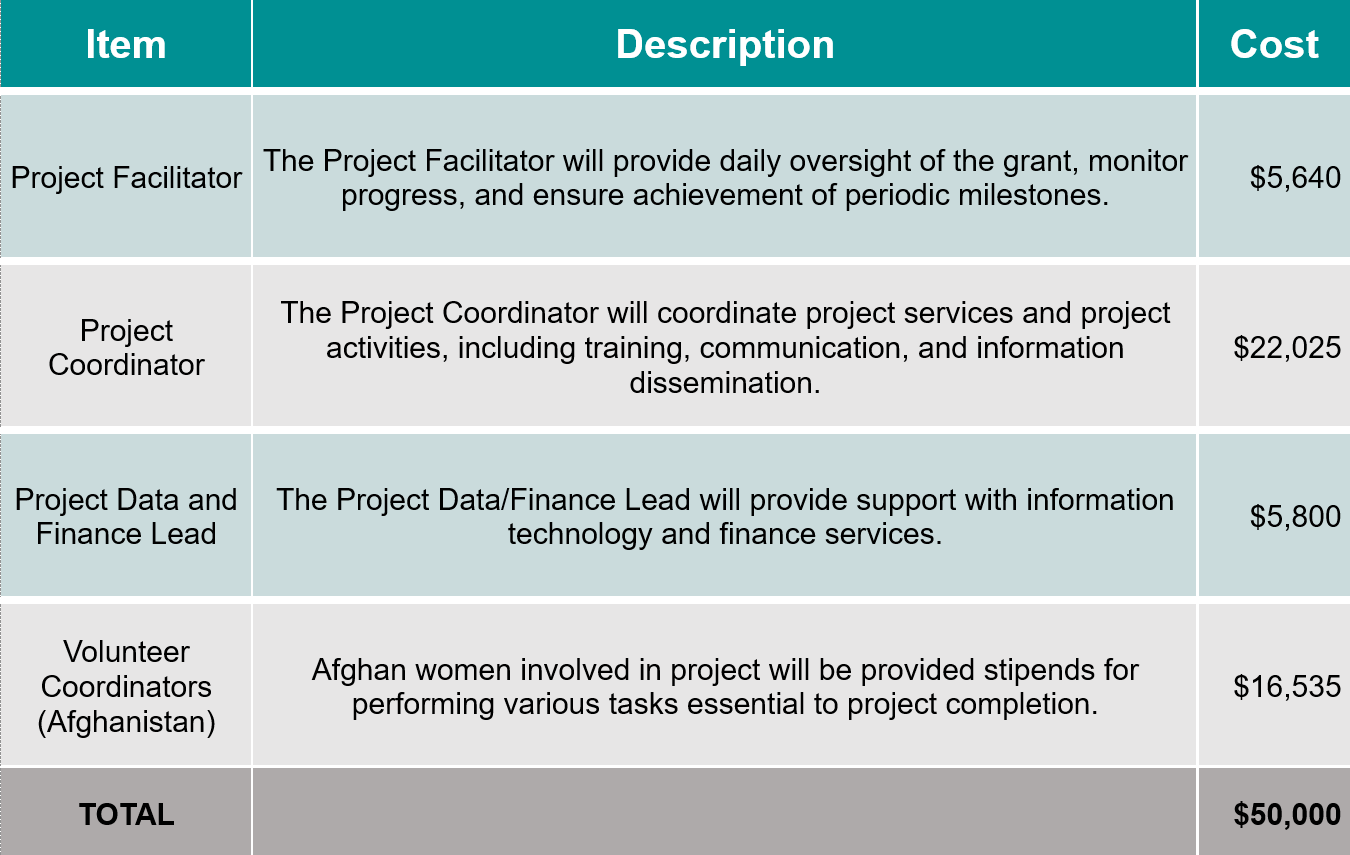
Why We Love This Project/Organization
We love how IANGEL connects volunteer lawyers to advance gender justice locally, nationally, and globally. This multi-faceted project provides the opportunity for Together Women Rise to address gender inequities in Afghanistan and the Taliban’s systematic oppression of its female population.
Anticipated Impact & Outcomes
Together Women Rise’s grant will directly impact more than 2,240 women and girls, including lawyers and advocates, women served in the BRIDGE program, and teachers and girls in underground schools.
Ultimately, as new ideas are generated for global policy makers to drive change in Afghanistan, the number of women and girls benefiting from this project could reach half the Afghan population, or approximately 20 million people.
Impact Story
Meet Nahal
Prior to August of 2021, Nahal’s days were fast-paced and challenging. Through her work as a lawyer in Afghanistan, she was making a difference for her community and her family. Today, she lives in isolation and fear.
But that isn’t the end of her story.
Nahal is 40 years old and, for the past five years, she has been the sole breadwinner for her household of eight people. She has deep experience handling criminal cases in the family law department, assisting women and children who have been subjected to violence and abuse. She also worked on civil and commercial cases and was both a trainer and a manager in the Afghanistan courts under the prior government. But the Taliban’s rise to power changed everything.
 Nahal and women like her have been virtually erased from public life. Nahal has been banned from work, unable to earn money to support herself and her family. Because she has no male escort, even handling necessities of life is restricted. Without funds to pay for internet access, she had to stop taking online English courses, and she sold her ring to help with expenses. With a terrible economy, lack of income, and forced isolation, she is a virtual prisoner in her own home, in the shadows of despair. She lives in fear of being targeted by the Taliban and being forced to marry against her will.
Nahal and women like her have been virtually erased from public life. Nahal has been banned from work, unable to earn money to support herself and her family. Because she has no male escort, even handling necessities of life is restricted. Without funds to pay for internet access, she had to stop taking online English courses, and she sold her ring to help with expenses. With a terrible economy, lack of income, and forced isolation, she is a virtual prisoner in her own home, in the shadows of despair. She lives in fear of being targeted by the Taliban and being forced to marry against her will.
IANGEL’s BRIDGE project provides a vital connection and a new source of hope for Nahal. Through Together Women Rise’s funding of BRIDGE, IANGEL is connecting with Nahal and other Afghan women lawyers, forging a new network of solidarity and support, which they can pay forward to advise women victims of violence in Afghanistan and to help girls and women who are banned from education. They are creating a new future for themselves and the women and girls who will follow in their path.
Learn More
CNN report on the plight of women and girls two years after the Taliban takeover (includes video).
2022 report on Taliban edicts.
Source Materials
- https://www.unwomen.org/en/news-stories/statement/2023/08/statement-on-afghanistan-by-un-women-executive-director-sima-bahous
- https://www.savethechildren.org/us/charity-stories/afghanistan-women-girls-conflict
- https://femena.net/2024/01/24/perpetuating-state-violence-against-women-in-iran-and-afghanistan-through-hijab-enforcement/
- https://www.unwomen.org/en/news-stories/speech/2023/09/speech-the-womens-rights-crisis-listen-to-invest-in-include-and-support-afghan-women
- https://www.usip.org/tracking-talibans-mistreatment-women
- https://www.thelancet.com/series/conflict-health
- https://www.ncbi.nlm.nih.gov/pmc/articles/PMC7612212/#:~
- https://www.law.georgetown.edu/gender-journal/online/volume-xxiv-online/the-disproportionate-effects-of-war-and-conflict-on-women-and-girls/
- https://www.stoprapenow.org/about/
- https://www.unwomen.org/en/what-we-do/peace-and-security/facts-and-figures
- https://www.undp.org/afghanistan/press-releases/undp-report-paints-grim-picture-afghanistan-year-after-transition
